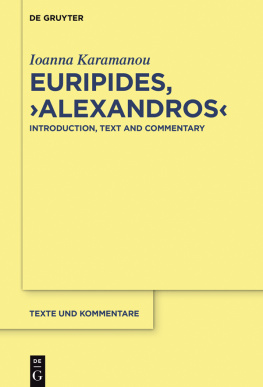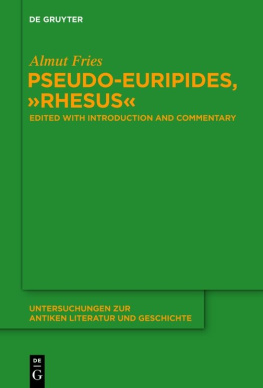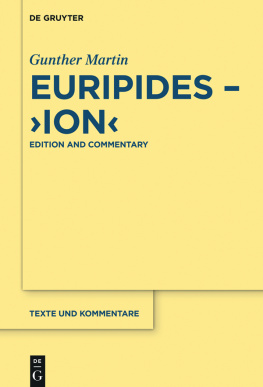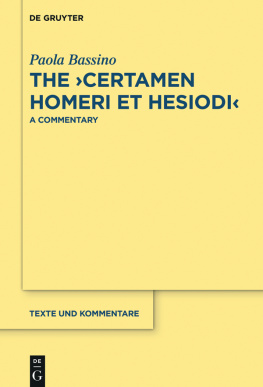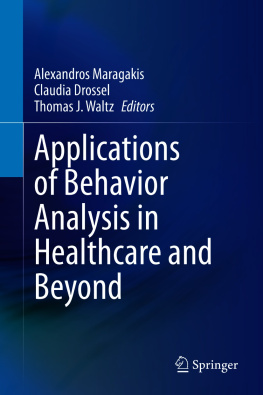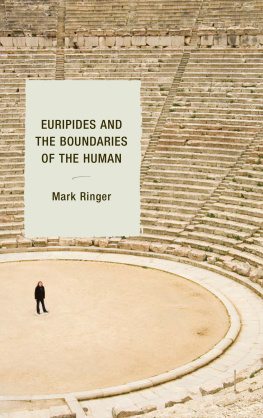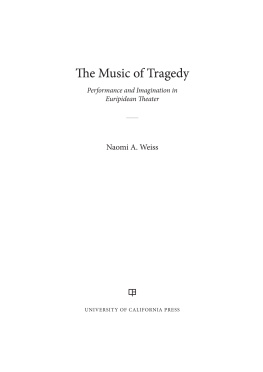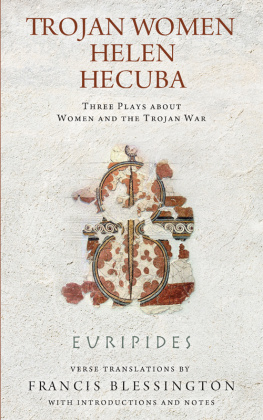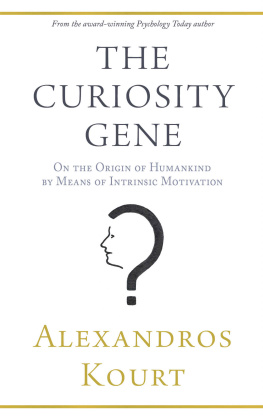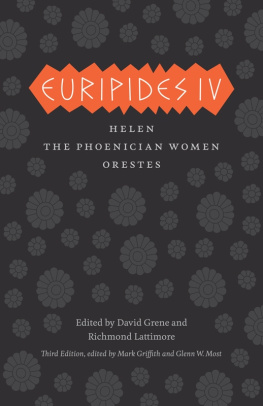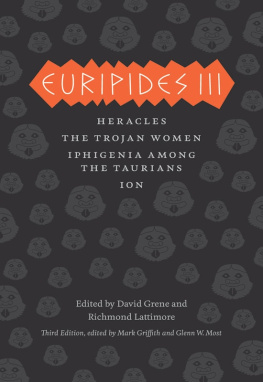Table of Contents
Guide

Ioanna Karamanou
Euripides, Alexandros
TEXTE UND KOMMENTARE
Eine altertumswissenschaftliche Reihe
Herausgegeben von
Michael Dewar, Adolf Khnken,
Karla Pollmann, Ruth Scodel
Band 57
De Gruyter
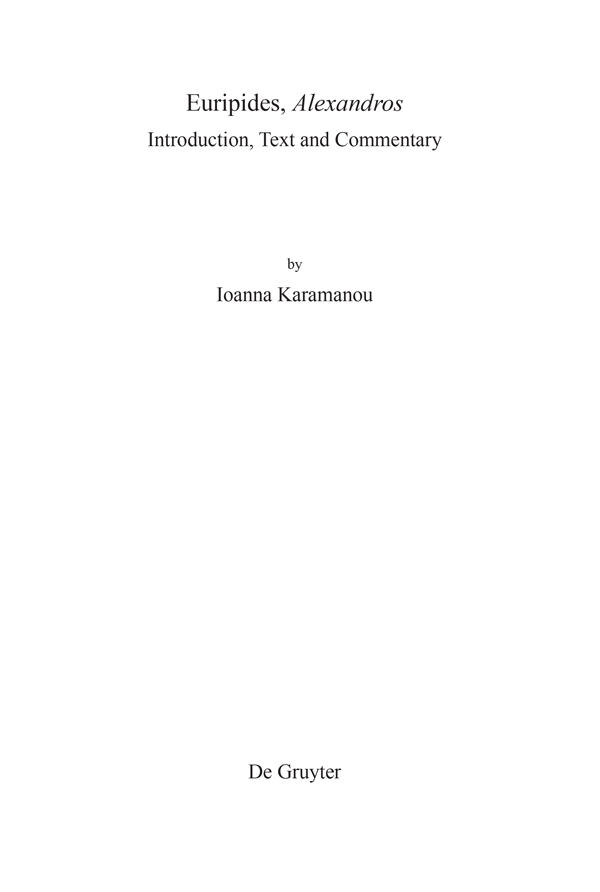
ISBN 978-3-11-053402-3
e-ISBN (PDF) 978-3-11-053728-4
e-ISBN (EPUB) 978-3-11-053618-8
ISSN 0563-3087
Library of Congress Cataloging-in-Publication Data
A CIP catalog record for this book has been applied for at the Library of Congress.
Bibliografische Information der Deutschen Nationalbibliothek
Die Deutsche Nationalbibliothek verzeichnet diese Publikation in der Deutschen Nationalbibliografie; detaillierte bibliografische Daten sind im Internet ber http://dnb.dnb.de abrufbar.
2017 Walter de Gruyter GmbH, Berlin/Boston
www.degruyter.com
To Zoe-Georgia and George-Christos
Preface
The Alexandros is one of the best preserved fragmentary plays of Euripides, thanks to papyrus finds providing a large amount of text (P.Stras. 234244) and a narrative hypothesis (P.Oxy. 3650, col. i). The publication of this hypothesis by Revel Coles in 1974 revived scholarly interest in this play. Following Ruth Scodels seminal monograph on the Trojan trilogy in 1980, the Alexandros was included in a series of editions of Euripidean fragments, such as the first volume of the Bud edition by Franois Jouan and Herman van Looy in 1998, the major critical edition by Richard Kannicht ( TrGF V) in 2004 and the Loeb edition by Christopher Collard and Martin Cropp in 2008. The fragments of the Alexandros were included alongside an English translation, an introduction and a brief commentary in the Aris & Phillips/ Oxbow collection of Euripidean fragmentary plays by Christopher Collard, Martin Cropp and John Gibert in 2004, whereas in 2012 an Italian monograph was published by Lidia Di Giuseppe involving an extensive reconstruction of the play with a particular focus on aspects of interpretation.
The present book provides the first full-scale commentary on Euripides Alexandros along with a re-edition of the Strasbourg papyrus fragments, whose re-inspection has resulted in new readings. To address textual problems and philological matters I have also re-inspected the Oxyrhynchus hypothesis of the play and the manuscripts of the book fragments, where needed. Owing to the multiplicity of sources for the text of the testimonia and of the book fragments, one may refer to the particular editions cited with regard to the manuscript sigla of each source.
The commentary aims at shedding light on various aspects of Euripidean style, ideology and dramatic technique, such as rhetoric, stagecraft, imagery, key thematic and structural patterns. The introduction explores Euripides refiguration of the mythical tradition, offers a reconstruction of the play and an investigation of issues of characterization, staging, interpretation within the context of its original production, textual transmission and reception. The latter calls for particular analysis, since, despite the fragmentary state in which the Alexandros has reached us, it has enjoyed a fascinating Nachleben in literary, dramaturgical, performative and artistic terms. Moreover, research on this play could contribute to our understanding of the trends of later Euripidean drama, especially the dramatists innovation and experimentation with plot-patterns and staging conventions. At the same time, it could stimulate a more comprehensive reading of the extant Trojan Women belonging to the same trilogy, which is the sole Euripidean production having features of a connected trilogy. Thus, the information which can be retrieved through the interrogation of the rich fragmentary material could contribute to supplementing and contextualizing the extant corpus, as well as showcasing the vitality and multiformity of Euripidean drama as a whole.
On methodological grounds, the numbering of the fragments in this edition accords with their location in the dramatic plot; for reasons of coherence, fragments coming from the same scene are grouped together in introductory sections in the commentary (frr. 12, frr. 36, frr. 812, frr. 1314, frr. 1517, frr. 18ab), so that these scenes are discussed as a whole before the particular commentary on each fragment.
This book has taken quite a long time to complete, but it has profited greatly from significant feedback by the anonymous readers who reviewed it for publication in this series, by referees in international peer-reviewed journals, to which I submitted particular articles, and by international conference audiences, especially at the Institute of Classical Studies in London, the 26 th International Congress of Papyrology in Geneva and the 3 rd Trends in Classics Conference in Thessaloniki. I am most grateful to the editors of Texte und Kommentare , Professor Michael Dewar, late Professor Adolf Khnken, Professor Karla Pollmann and Professor Ruth Scodel, for accepting this book for publication in their renowned series. I owe a very special debt to Professor Ruth Scodel for showing a lively interest in this project, for kindly encouraging me to submit the manuscript for publication in this series and for having set the foundation for the study of the Alexandros with her highly influential book on the trilogy of 415 BC. Warmest thanks are also due to Ms Katharina Legutke for her admirable editorial guidance in the process of publication of this book by De Gruyter.
I am wholeheartedly indebted to Professor Chris Carey for having read and commented on a considerable part of this book and for being an unfailing source of support, a true mentor, for more than fifteen years. I have been extremely fortunate to benefit from the scholarly acumen of two world-leading experts on Euripidean fragments, Professor Christopher Collard and Professor Martin Cropp, who kindly took the time to read parts of this book offering valuable insight into thorny issues of the play. I am truly grateful to Professor Mike Edwards, Professor Richard Janko and Professor Cornelia Roemer for their brilliant advice on textual matters; to Professor Adele Scafuro for her most thoughtful comments; to Professor Lorna Hardwick for discussing fascinating aspects of performance reception with me and to David Stuttard for a fruitful and stimulating dialogue about the contemporary staging of the Alexandros .
In Greece I have benefited enormously from the valuable, ongoing encouragement and the vigorous scholarly advice of Professor Ioannis Kazazis and Professor Antonios Rengakos. I owe one of the greatest debts of gratitude to late Professor Daniel Jacob, who kindly read most of my papers on the Alexandros submitting them to constructive criticism, but, above all, I am grateful for his generosity and humanity. His demise has been an irrecoverable loss for Greek scholarship and academic life. Sincerest thanks are due to my colleagues at the Department of Theatre Studies of the University of the Peloponnese for providing a stimulating environment for interdisciplinary interaction and for granting me a research leave in the winter semester of 201314, which enabled me to focus on this research exclusively.
My parents, Andreas and Georgia, and my brother, Yiannis, have been a constant source of inspiration and support more than I could ever express in words. Heartfelt thanks are due to Manos Papazoglou for his ongoing motivation, kind understanding and encouragement all these years. This book is dedicated to our children, Zoe-Georgia and George-Christos, the joy of my life. It is a very small recompense for their love, affection and enormous patience, for all of which I am profoundly and eternally grateful.

